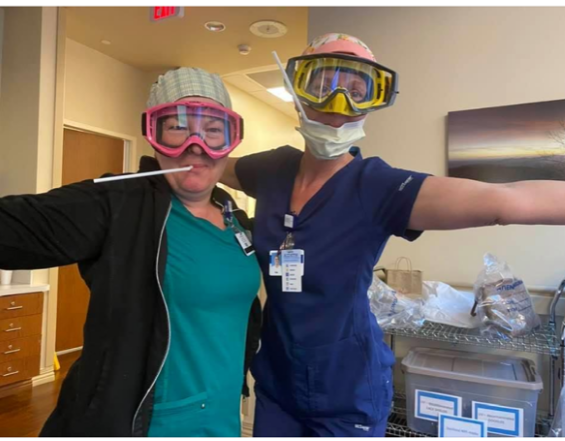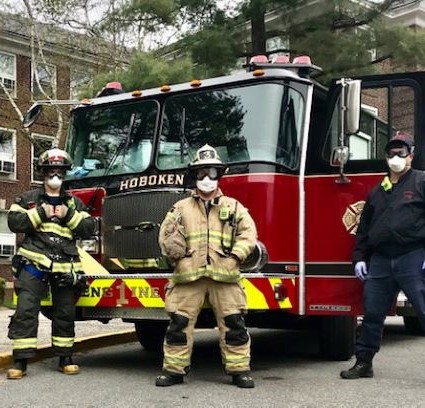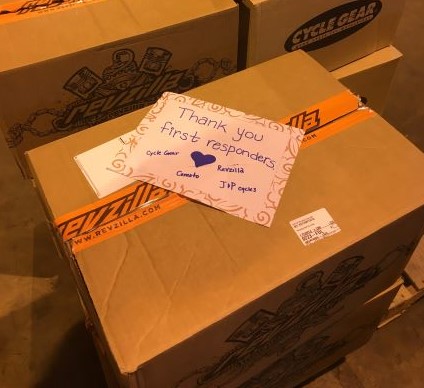COMOTO Holdings – RevZilla, Cycle Gear, J&P Cycles with Multiple Hospitals

Nurses at Emory Health – John’s Creek Hospital, Georgia model goggles provided by Comoto Holdings
An Interview with Martina Mansell
Communications & Community Relations Specialist, Comoto Holdings
Nonprofit Organizations supported
Individual frontline workers, both in the Greater Philadelphia region (Philadelphia Office of Emergency Management, CHOP, Temple University Hospital and Jefferson Hospital Washington Township) and nationally.
How the Partnership Started
In February, we introduced “Comoto Cares” to all 1,800 employees in our new family of brands. I was thrilled to take what had started in 2015 as RevZilla’s employee-driven ZLAnthropy program (including 16 hours of Paid Volunteer Time Off for all full-time employees) and roll it out to our stores, distribution centers and offices across the country.
Comoto Cares barely got off the ground before the pandemic started and everything changed. We took the basic principle of serving the communities that our people live in and applied that to these new and unprecedented circumstances to take care of our communities and to help our employees help others.
We pivoted Comoto Cares to respond to the PPE needs of the healthcare workers in our communities. Ken Murphy, our CEO, committed to donating $50,000 worth of inventory to hospitals and emergency management offices, and we reallocated $30,000 from the charitable giving budget to support COVID-19-related donation requests from employees.
So far, we’ve donated over 4,000 goggles locally (to the City of Philadelphia’s Office of Emergency Management; Children’s Hospital of Philadelphia; Jefferson Hospital, Washington Township, NJ; and Temple University Hospital) and nationally (UCLA Health; LAC USC Medical Center; Banner Health, AZ; Emory Health, GA; and the Hoboken Fire Dept).
Changing Face of Employee Engagement
I worked directly with our executive leadership to quickly get buy-in for our proposed community outreach initiative. Taking advantage of my dual role of communications and community relations, I then acted as liaison between our Business Continuity Planning team and our 1800 employees across the country. For four weeks, starting Thurs., March 12, I sent a daily email to all employees to keep them informed about new practices and policies as directives changed across the country. Through these communications, I was able to spread the word about our donations and connect with coworkers directly. Comoto employees across the country have requested goggle donations for healthcare and emergency response systems where their friends and families work.
We also created an “EP for PPE” program to allow employees to use their Employee Purchase discount to send gear directly to their friends and family working on the frontlines. Someone sent goggles to her brother-in-law, a police officer in Oakland, CA. Someone else ordered goggles for his wife’s team at CHOP’s ICU. I sent a box of goggles and neoprene face masks to a friend who’s a nurse at HUP.
Whereas the bulk goggle donations we made took longer to pack and ship, the smaller Employee Purchases were able to be delivered within a few days. People felt anxious and impotent, and providing these avenues to help their loved ones gave our employees a way to physically protect them, and, I think, gave everyone a little psychological relief, too.
The Power of Connections
Through the GPCVC, I’ve been able to connect directly with supply coordinators at local hospitals. Once an employee asks for a donation to be made, it can be difficult to get in touch with the overwhelmed administrators. Thanks to connections from the GPCVC, I’ve been able to confirm donation requests and get accurate shipping information to get them supplies as quickly as possible.
The Power of Corporate Volunteers
I’ve been thinking about the place of volunteers in public policy lately. I would like to see volunteerism recognized as an essential service. Nonprofits work to solve the problems that our governmental policies haven’t fixed. The lives and livelihoods, the educational, health, and nutritional needs of our residents have always been precariously balanced. This crisis has made the gaps in our safety nets painfully and inescapably visible. Corporate volunteer programs play a major role in supporting local nonprofits.
Those nonprofits are essential, yet the volunteer labor they rely on to provide essential services was not included in the official “shelter in place” orders. I think that was a terrible oversight. Overnight, volunteer rosters were wiped clean as we canceled our corporate volunteer events to comply with the directions we were given from cities, states, and CEOs.
Volunteering is tough. It takes courage to sign up, show up and risk the intense emotional experience of community connection. But the reward — that warm and fuzzy feeling that supercharges a room — that’s what people need during a crisis. They need to help, to connect to be part of the solution. And the essential workers, the patients, the already-neglected and vulnerable need to know that they’re not alone, that they haven’t been forgotten and left to fend for themselves.
Everyone loves to quote Mr. Rogers in dark times. “Look for the helpers,” he said. But people forget that that’s what his mother said to comfort him when he was a child. As adults, as good corporate citizens, I think “Be the helpers” should be our mantra, and volunteerism should be included in future emergency planning

